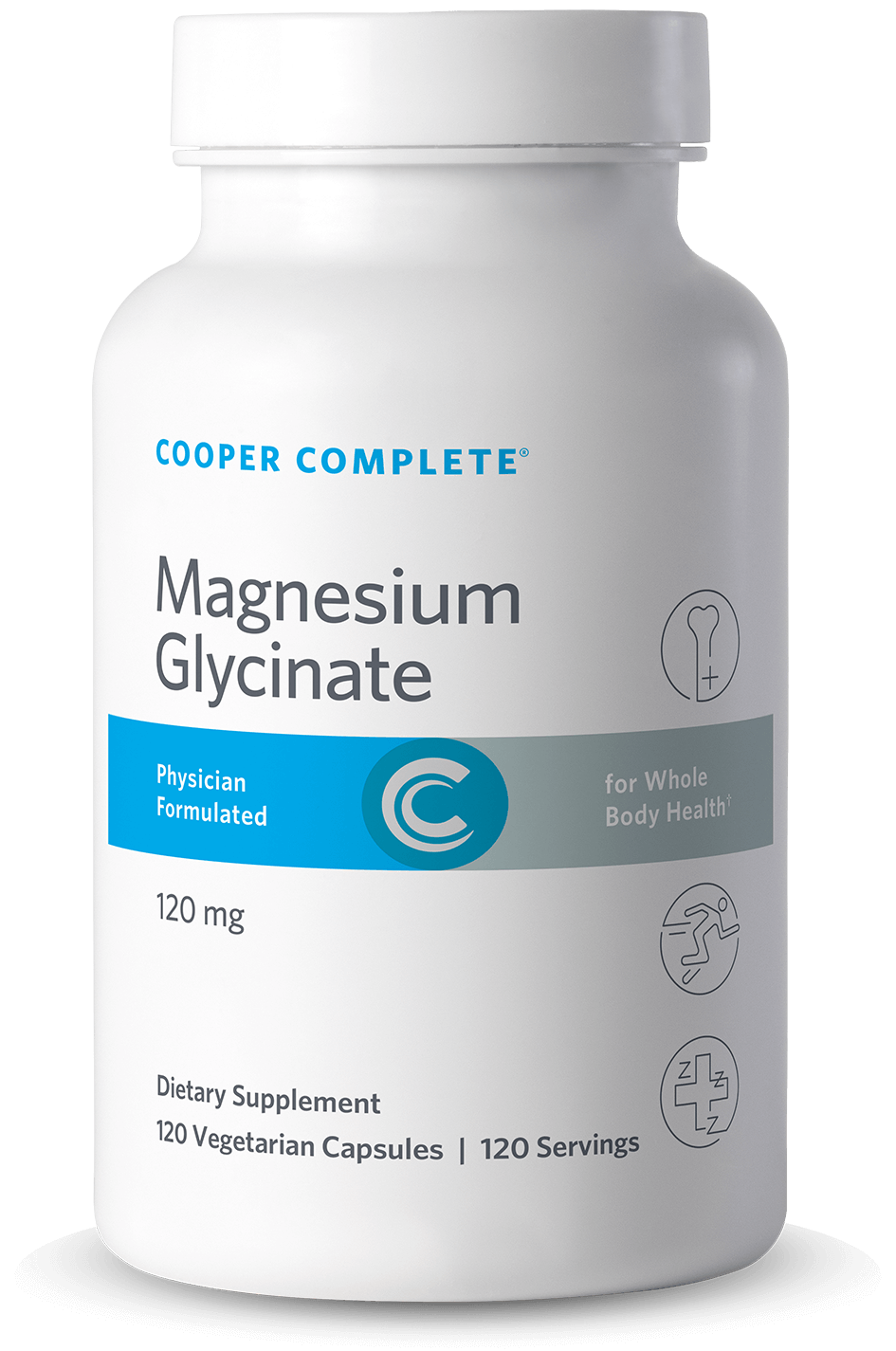Magnesium Supplement Benefits for a Healthy Body

Magnesium supplement benefits the body in several ways and is essential to optimal health. Various key functions of magnesium include increasing energy, regulating sleep, improving bone density and supporting heart health.
Overall, magnesium is the fourth most abundant mineral in our body. In fact, about fifty to sixty percent of the body’s magnesium is found in our bones. It protects vital processes in the body to maintain a healthy lifestyle.

120 mg Magnesium Glycinate Supplement
Chelated magnesium glycinate (also known as magnesium bis-glycinate) is well absorbed without significant laxative effects.
$24.98 Add to cartMagnesium Benefits in the Body
Effective Energy Production from Magnesium
Energy production is critical to keeping the body running properly on a daily basis. To produce the energy it needs, the body uses magnesium to convert the food we eat into fuel. Whether it is fats, proteins or carbs, these foods all need magnesium for the body to use them.
Furthermore, a lack of magnesium in a balanced and healthy diet has similar opposite effects. Low levels of magnesium are consistently linked with an increased risk of diabetes. A common symptom of diabetes is constant fatigue. This symptom is related to insulin resistance that develops in the absence of magnesium.
Magnesium Improves Bone Density with Vitamin D and Calcium
Magnesium works with vitamin D and calcium, and other nutrients to form strong bones. For vitamin D, magnesium creates a loop where magnesium helps the body absorb vitamin D. This loop completes as vitamin D and then increases magnesium use in the body. Breaking this loop with low levels of either nutrient leads to numerous problems. Deficiency in either is associated with various brittle bone diseases such as osteoporosis and rickets.
Calcium’s connection to magnesium involves a similar relationship loop. Magnesium protects the body by controlling calcium amounts in bones and their cells.
First, magnesium prevents excess calcium from forming in one place. However, it also prevents calcium from leaving a cell when low amounts are present. Bones rely on this process for structural strength. Specifically, magnesium protects the bones from the body taking too much calcium from them, resulting in brittle bone structure.
Improving Sleep with Better Magnesium Levels
Lack of sleep can be a contributing factor in many health issues. Occurrences of heart disease, diabetes, cold, and flu are more likely with less sleep.
Magnesium is involved in regulating the daily cycle of many aspects of the body. A recent study found that magnesium levels rose and fell based on a 24-hour sleep cycle. This correlates with increased energy production during the awake hours and reduced energy output at night.
Supporting Healthy Heart Function with Magnesium
In looking at heart health, magnesium is an important mineral for proper function. Magnesium interacts with the heart and the connections to it. One way, in a variety of ways, is helping blood vessels relax and pump at a lower pressure.
It is also an important electrolyte for muscle function. Exercise causes a loss of magnesium through sweat, like many electrolytes. Furthermore, low electrolyte levels increase the risk of muscle cramps and spasms. With the heart being a muscle in the body, healthy electrolyte levels can ensure healthy heart function during physical activity.
Finally, further studies on heart disease and heart failure have shown the importance of magnesium. A study published by the American Heart Association confirms this. An association was found between low magnesium levels and an increase in mortality rates from heart disease.
Magnesium Rich Foods and Supplements
Foods High in Magnesium
Foods that are high in fiber generally have high levels of magnesium. Dietary sources of magnesium include whole grains, vegetables, seeds, and nuts. In addition, other sources include dairy products, meats, chocolate, and coffee.
Magnesium Supplements to Raise Levels
The daily recommended intake for magnesium is 400 mg for men 19 to 30 years of age and 420 mg for men over 30 years of age, 310 mg for women 19 to 30 years of age and 320 mg for women over 30 years of age. Cooper Clinic routinely tests magnesium levels as part of the comprehensive preventive. For example, A normal blood plasma level is 1.8 to 2.4 mg/dL.
Cooper Complete Basic One Multivitamin contains 200 mg in our and 660 mg in our Original Multivitamin.
As a reminder, your physician understands your health profile best, so it’s important to talk to him/her about which supplements are best for you.
